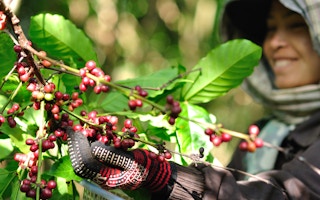An increasing number of smaller businesses are following in the footsteps of multinationals like Unilever by adopting sustainable sourcing strategies.
The impact of climate change on crop yields is a major concern, both for the three-in-four people in developing countries who depend on agriculture for their livelihoods and for the global food and drink industry. Mark Driscoll, Head of Food at Forum for the Future, believes food manufacturers, along with their supply chain partners, have a societal responsibility to address these issues – a matter for debate. But they must also do so to ensure the success of their business, he says, securing supply chains “through sustainable sourcing and working with suppliers on continuous improvements.”
Alongside this stick, there’s the carrot of increasing consumer demand for sustainably sourced products. The years 2007-2011 saw a 168 per cent growth in UK sales of Fairtrade products. Many multinationals have already responded. Unilever, which buys around 12 per cent of the world’s black tea, 3 per cent of tomatoes and 3 per cent of palm oil, has set a goal of sourcing all of its raw agricultural supplies sustainably by 2020. The partnership it has formed with the Netherlands-based Sustainable Trade Initiative (IDH) and the Kenya Tea Development Agency (KTDA) to co-fund farmer field schools is just one example of how this policy is playing out on the ground. Between 2007 and 2012, 450,000 smallholder tea farmers were trained to the Rainforest Alliance standard in preparation for certification – something that will benefit the entire tea industry.
For SMEs, however, projects of this scale are simply beyond their means. Even attaining certification for sustainable sourcing can prove costly: the UK statement on sustainable palm oil [November 2013] noted that for companies which may only be using a very small amount of palm oil, the resources associated with membership of the Roundtable on Sustainable Palm Oil and certification are “operationally and cost prohibitive”. This is not to say SMEs can’t make great strides towards sustainable sourcing, particularly if it is a key part of their brand strategy. Their agility and flexibility can even lend them an advantage.
“
For companies which may only be using a very small amount of palm oil, the resources associated with membership of the Roundtable on Sustainable Palm Oil and certification are “operationally and cost prohibitive”. This is not to say SMEs can’t make great strides towards sustainable sourcing, particularly if it is a key part of their brand strategy. Their agility and flexibility can even lend them an advantage.
Take Theo, a Seattle-based chocolate maker which pays between $3,800 and $4,500 per ton for the cocoa beans it sources from the Democratic Republic of Congo – well in excessive of the Fairtrade premium of $200 above the world cocoa price per ton (currently $3,050). Through its partnership with the Eastern Congo Initiative it is helping to train 2,000 farmers in a region most companies avoid, and has secured a supply of high-quality beans. Alter Eco, which sells quinoa, rice, chocolate and sugar, also works directly with small-scale, farmer-owned cooperatives, helping them to develop fair trade and organic practices. It offers long-term contracts at prices that are 10-30 per cent higher than the local market price, with an additional fair trade premium, and prepays for crops so that farmers can plan more effectively for the future.
To help more SMEs adopt similarly sustainable approaches to their supply chains, the Food and Drink Federation (FDF) is supporting a WRAP-led project to develop a sustainable sourcing commodity risk assessment tool, which is expected to be ready for testing within businesses later this year. It will help food and drink companies identify and address the potential environmental, social and economic risks within their current business model. A trial should begin later this year with a limited number of commodities, before being expanded to cover a much wider range.
The FDF has also produced a guide, ‘Sustainable Sourcing – Five Steps Towards Managing Supply Chain’, to encourage manufacturing businesses to identify critical ingredients and other inputs: where they come from, how secure the source is, and what alternatives there are if it is disrupted. “There is a lot of longer-term gain for businesses of whatever size in asking these hard questions now up front”, says David Bellamy, Environmental Policy Manager at the FDF. He emphasises the importance of talking to suppliers and trade associations in order to “build up a map of your supply chain for each commodity”, which needs to be constantly reviewed over time.
Many food and drink SMEs are at the beginning of this process. Indeed, the immediate pressures of surviving in a volatile market place can sometimes outweigh long-term commitments to sustainable sourcing. Driscoll insists on the importance of easy-to-use tools, financial support and training to get buyers thinking “beyond cost-effectiveness and profit issues”. It’s no exaggeration to say that the future of these enterprises depends on it.
Duncan Jeffries writes for Green Futures. This article originally appeared in Green Futures, the leading magazine on environmental solutions and sustainable futures published by Forum for the Future.

















